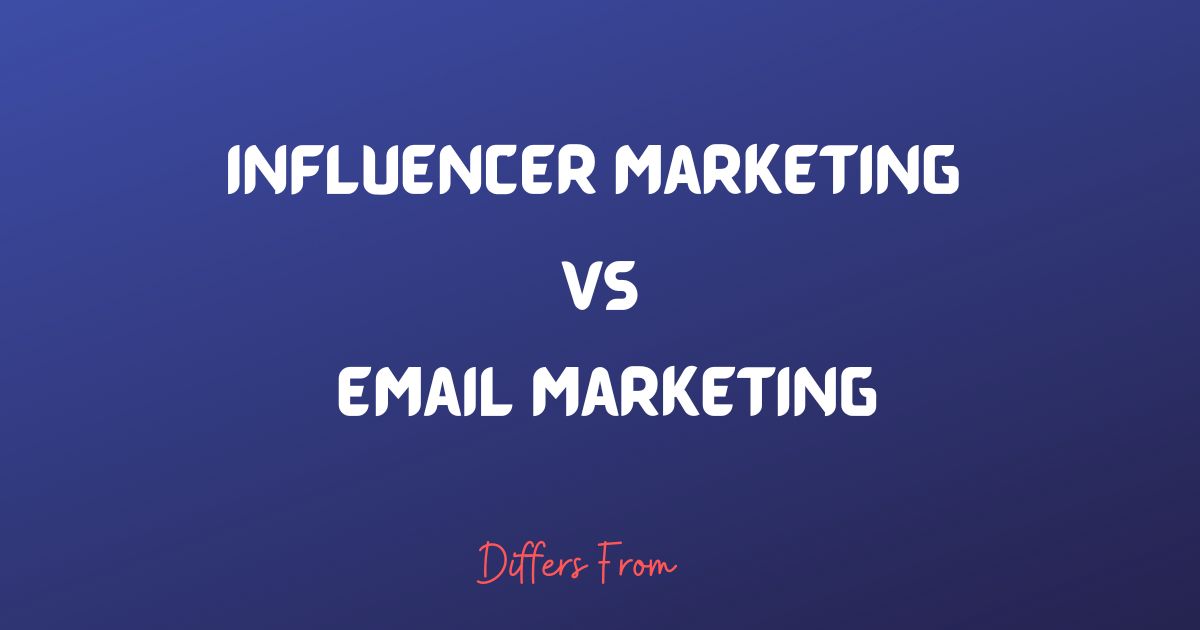Are you looking to boost your brand’s online presence, but you’re not sure which marketing strategy is the right fit for your business?
In today’s digital landscape, the choices can be overwhelming, with numerous avenues to explore. Two of the most prominent and effective methods are influencer marketing and email marketing.
In this blog, we’ll explore the differences between these two strategies and help you choose the one that suits your goals and target audience.
So, let’s embark on this journey to discern the fundamental distinctions and discover which path suits your marketing aspirations.
Difference between influencer marketing and email marketing.
| Influencer Marketing | Email Marketing | |
Objective: | Aims to leverage the popularity and influence of social media personalities and content creators to promote a product, service, or brand. | Focuses on reaching and engaging a target audience through personalized emails to promote products, services, or content. |
Medium: | Utilizes social media platforms, primarily Instagram, YouTube, TikTok, and others, where influencers have a substantial following. | Utilizes email as the primary channel for communication. |
Content: | leverages the trust and credibility that followers have in the influencer’s recommendations and endorsements. | Involves the creation of email content, which may include text, images, links, and calls to action (CTAs). |
Audience: | Targets a broader audience, often reaching the followers and subscribers of the influencer, which may include a mix of demographics. | Focuses on a more specific audience, often segmented based on user data and preferences collected over time. |
Trust and Credibility: | everages the trust and credibility that followers have in the influencer’s recommendations and endorsements. | Relies on the trust established between the sender (business) and the recipient (subscriber) through consistent, relevant, and non-intrusive communication. |
Measurement: | Metrics often include engagement rates (likes, comments, shares), reach, and follower growth. | Metrics include open rates, click-through rates (CTRs), conversion rates, and ROI (Return on Investment). |
Cost: | Costs can vary significantly based on the influencer’s popularity and reach, making it potentially expensive. | Costs are relatively lower as they involve email marketing software fees, and can be highly cost-effective when managed effectively. |
Longevity: | Influencer marketing campaigns may have a shorter lifespan, and their impact can be fleeting. | Email marketing allows for ongoing and long-term engagement with subscribers, building a lasting relationship. |
Regulations: | Influencer marketing is subject to various advertising and disclosure regulations, such as FTC guidelines for transparency. | Email marketing is subject to strict regulations, including the CAN-SPAM Act and GDPR, which require clear opt-in and unsubscribe options. |
Personalization: | Personalization is typically limited to the influencer’s style and content. | Email marketing offers extensive personalization options, tailoring messages based on user behavior, preferences, and demographics. |
Examples: | A fashion brand is collaborating with a fashion influencer to showcase their latest collection. | An e-commerce platform sending personalized product recommendations to a subscriber based on their browsing and purchase history. |
What is influencer marketing?
Influencer marketing is a strategy that involves collaborating with popular individuals, known as influencers, who have a significant following on social media platforms.
These influencers use their influence and credibility to promote products or services to their audience.
By partnering with influencers, brands can reach a wider target audience, enhance brand awareness, and potentially drive sales through the influencer’s endorsement and recommendations.
What is email marketing?
Email marketing is a digital marketing tactic that involves sending targeted messages and promotional content directly to a list of subscribers’ email addresses.
It is a highly effective method for engaging and nurturing leads, as well as maintaining customer relationships. According to statistics, email marketing has an average ROI of $42 for every $1 spent and is estimated to reach 4.48 billion users by 2024, making it a valuable tool for businesses to drive conversions and generate revenue.
Comparison between influencer marketing and email marketing
Influencer marketing leverages the reach and influence of popular individuals to promote products or services, while email marketing relies on direct communication through personalized emails to engage subscribers.
Both strategies have unique strengths and can be effective when implemented strategically, depending on the brand’s goals, target audience, and resources available.
Influencer marketing and email marketing are both powerful strategies in the realm of digital marketing, but they differ in several key aspects.
Reach and Targeting
Influencer Marketing: By collaborating with influencers, brands can tap into their existing follower base and reach a broader audience.
Influencers have built their following based on specific interests or niches, allowing brands to target a particular demographic or market segment.
Email Marketing: With email marketing, businesses have direct access to their subscribers’ inboxes. This allows for more personalized and targeted messaging, as brands can segment their email lists based on factors like demographics, past purchases, or engagement levels.
This precision targeting ensures that messages reach the right people at the right time.
Credibility and Trust
Influencer Marketing: Influencers often have a loyal and engaged following that trusts their recommendations. When influencers endorse a product or service, it can generate credibility and trust among their audience.
This can lead to increased brand awareness and a higher likelihood of conversions.
Email Marketing: Effective email marketing builds trust over time through consistent and relevant communication. When subscribers willingly provide their email addresses, they express an interest in the brand, making them more receptive to promotional messages.
By consistently delivering valuable content and personalized offers, brands can establish credibility and foster long-term relationships with their subscribers.
Content Format
Influencer Marketing: Influencer marketing often relies on visual content, including images, videos, and live streams.
Influencers create content showcasing products or services in an authentic and engaging manner, leveraging their storytelling abilities and creativity to capture their audience’s attention.
Email Marketing: Email marketing encompasses a range of content formats, including text-based emails, images, videos, or a combination of these elements.
Brands can use compelling copy, persuasive visuals, and relevant CTAs to drive engagement and conversions.
Additionally, email marketing allows for automation and personalization, enabling brands to deliver tailored content based on subscriber preferences and behaviors.
Return on Investment (ROI)
Influencer Marketing: The ROI of influencer marketing can vary depending on factors such as the influencer’s reach, engagement rates, and the alignment between the brand and influencer.
Measuring the direct impact and quantifying the ROI of influencer marketing can be challenging, but it often involves tracking metrics like engagement, brand mentions, website traffic, and sales generated through unique referral codes or affiliate links.
Email Marketing: Email marketing is known for its high ROI. It is a cost-effective method, with an average return of $42 for every $1 spent.
Metrics such as open rates, click-through rates, conversions, and revenue generated can be easily tracked and analyzed.
A/B testing and optimization techniques can further enhance the performance and effectiveness of email marketing campaigns.
Conclusion
Influencer marketing harnesses the influence of popular individuals to reach a wider audience through authentic endorsements and engaging content.
It relies on the credibility of influencers and their ability to connect with their followers. On the other hand, email marketing leverages direct communication through personalized emails to nurture leads and maintain customer relationships.
It focuses on targeted messaging, segmentation, and building trust over time. Both strategies offer unique benefits and play distinct roles in a comprehensive digital marketing strategy.

